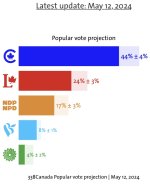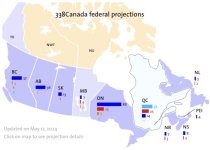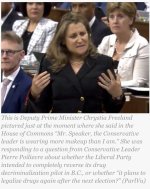Outdated Political spectrum graphs aside, are the Liberals or the Conservatives closest to the Canadian political center?

 en.wikipedia.org
Canada is a politically moderate country, with a mostly moderate voter base, so the large Conservative lead in the polls should surprise absolutely nobody.
en.wikipedia.org
Canada is a politically moderate country, with a mostly moderate voter base, so the large Conservative lead in the polls should surprise absolutely nobody.

Last week, the Liberal government granted British Columbia’s request to end its cursed drug decriminalization experiment that has only served to make the province’s addiction situation worse.
While the Liberals made the correct move, that refreshing sensibility felt rather out of place considering how enthusiastic this government has been about taking things to the extreme whenever possible. Drug addiction, immigration and the federal debt have risen to levels Canadians have never seen before.
Contrary to the reputation the Liberals have tried to foster in the past of being the sensible party of the centre, this government has been ambitious and radical in its approach to almost all areas of policy.
Prime Minister Justin Trudeau came to power in 2015 on a platform of moderate deficit spending, famously saying that, “The budget will balance itself.” Canadians voted for it, and are now feeling the effects of the most expensive federal government in our history.
Canadians did not vote for their cities to be overrun with desperate addicted people shooting up or smoking “safe supply” drugs, or for irresponsible levels of immigration to push the country’s public services to their limits.
Addicted people cannot be blamed for feeding their disease free of charge, nor can newcomers be bashed for being drawn to the possibility of a better life in Canada. Nonetheless, the federal government’s choices have radically increased the numbers of both those groups, with disastrous consequences.
Canada was not prepared to handle such an influx of newcomers. International students, whose numbers tripled under Trudeau, have been brought in to attend scam career colleges that issue fake degrees while they work minimum-wage jobs. Rather than a fresh start in a new, promising country, many international students have found themselves crammed into exorbitantly priced slum houses, or even homeless.
Combined with other factors, the increase in international students and other immigrants have contributed to Canada’s already sparse housing supply being stretched to its limits, thus exacerbating the affordability crisis. This resulted from the Liberals’ radical and reckless reforms to Canada’s immigration system, which the government only began to curtail after the problem became impossible to ignore.
Nevertheless, voters might have been prepared to forgive the Liberals if it were their only big mistake. Unfortunately, the strategy of maximizing bad policy and dealing with the consequences later is the Liberals’ modus operandi for seemingly every file.
Addiction was a problem before the Liberals came to power, but their decision to supply addicts with free drugs has made things far worse.
Many downtown cores are now filled with the tragic scenes of addicted people laying in the rain or snow while high out of their minds on drugs. Open drug use has turned public spaces into no-go zones, with children nightmarishly stepping on dirty needles and social trust in our communities eroding.
The “safe supply” of drugs is being diverted and sold on the streets all over British Columbia. Nurses in the province’s hospitals have expressed concern about being exposed to meth smoke while at work, because addicts are allowed to do drugs inside hospitals.
Who could have predicted that ensuring people remain hooked on drugs that kill them slowly would not pan out well?
It may confound the Liberals’ most slavish surrogates and talking heads that the Conservatives continue to pull ahead in the polls. Conservative Leader Pierre Poilievre talks like a populist, but compared to the Liberals and their NDP partners, the Tories are unmistakably the moderate option.
Promising to change course on a failed addictions strategy, fix the broken immigration system and get a handle on federal spending are not radical proposals in any way.
The idea that the federal Liberals are somehow the moderate, centrist party is one of the most egregious myths that has ever been pushed on Canadians. Since the end of Louis St. Laurent’s time as prime minister in 1957, the only centrist Liberal governments existed between 1993 and 2006 under prime ministers Jean Chrétien and Paul Martin.
Prime ministers Lester B. Pearson and Pierre Trudeau were radicals whose experimental policies transformed Canada. The younger Trudeau also pledged to transform Canada for the better, but average Canadians are still waiting to feel the positive results after almost nine years. In that time, life has become more unaffordable, public spaces made less safe and our consensus on immigration has been shattered.
Most of these infuriating and unfair outcomes were the result of policy choices made by the federal government, and Canadians appear ready to make the Liberals feel the consequences.
Last year, Manitoba NDP Leader Wab Kinew was elected premier by pitching sensible, pragmatic policies that made him sound nothing like Jagmeet Singh, the Rolex-wearing socialist who heads the federal NDP. It turns out that moderates are rather popular in Canada, regardless of their partisan affiliation.
In 2022, Ken Sim was elected mayor of Vancouver in a landslide, after promising to hire more police officers and nurses to help improve the city’s acute addiction crisis. Unsurprisingly, promising to bring calmness to the chaos caused by extreme, radical policies, rather than countering radicalism with more radicalism, turned out to be a popular approach.
Liberal partisans and politicians often negatively compare the modern Conservative party to the former Progressive Conservatives, feigning praise for the PCs’ supposedly moderate platforms that rarely got them elected. The great irony is that the modern Conservatives are the only party left in Ottawa that can credibly claim to the moderate in 2024.
This has been an era of political and social extremes, and whether it be spending, immigration, addiction or parental rights, this ambitious Liberal government has proven itself incapable of being measured or cautious.

 apple.news
apple.news

Canadians, mostly mild and moderate people, are bearing the consequences of that, and seem all too eager for a change.
(??????????????)

Politics of Canada - Wikipedia

Last week, the Liberal government granted British Columbia’s request to end its cursed drug decriminalization experiment that has only served to make the province’s addiction situation worse.
While the Liberals made the correct move, that refreshing sensibility felt rather out of place considering how enthusiastic this government has been about taking things to the extreme whenever possible. Drug addiction, immigration and the federal debt have risen to levels Canadians have never seen before.
Contrary to the reputation the Liberals have tried to foster in the past of being the sensible party of the centre, this government has been ambitious and radical in its approach to almost all areas of policy.
Prime Minister Justin Trudeau came to power in 2015 on a platform of moderate deficit spending, famously saying that, “The budget will balance itself.” Canadians voted for it, and are now feeling the effects of the most expensive federal government in our history.
Canadians did not vote for their cities to be overrun with desperate addicted people shooting up or smoking “safe supply” drugs, or for irresponsible levels of immigration to push the country’s public services to their limits.
Addicted people cannot be blamed for feeding their disease free of charge, nor can newcomers be bashed for being drawn to the possibility of a better life in Canada. Nonetheless, the federal government’s choices have radically increased the numbers of both those groups, with disastrous consequences.
Canada was not prepared to handle such an influx of newcomers. International students, whose numbers tripled under Trudeau, have been brought in to attend scam career colleges that issue fake degrees while they work minimum-wage jobs. Rather than a fresh start in a new, promising country, many international students have found themselves crammed into exorbitantly priced slum houses, or even homeless.
Combined with other factors, the increase in international students and other immigrants have contributed to Canada’s already sparse housing supply being stretched to its limits, thus exacerbating the affordability crisis. This resulted from the Liberals’ radical and reckless reforms to Canada’s immigration system, which the government only began to curtail after the problem became impossible to ignore.
Nevertheless, voters might have been prepared to forgive the Liberals if it were their only big mistake. Unfortunately, the strategy of maximizing bad policy and dealing with the consequences later is the Liberals’ modus operandi for seemingly every file.
Addiction was a problem before the Liberals came to power, but their decision to supply addicts with free drugs has made things far worse.
Many downtown cores are now filled with the tragic scenes of addicted people laying in the rain or snow while high out of their minds on drugs. Open drug use has turned public spaces into no-go zones, with children nightmarishly stepping on dirty needles and social trust in our communities eroding.
The “safe supply” of drugs is being diverted and sold on the streets all over British Columbia. Nurses in the province’s hospitals have expressed concern about being exposed to meth smoke while at work, because addicts are allowed to do drugs inside hospitals.
Who could have predicted that ensuring people remain hooked on drugs that kill them slowly would not pan out well?
It may confound the Liberals’ most slavish surrogates and talking heads that the Conservatives continue to pull ahead in the polls. Conservative Leader Pierre Poilievre talks like a populist, but compared to the Liberals and their NDP partners, the Tories are unmistakably the moderate option.
Promising to change course on a failed addictions strategy, fix the broken immigration system and get a handle on federal spending are not radical proposals in any way.
The idea that the federal Liberals are somehow the moderate, centrist party is one of the most egregious myths that has ever been pushed on Canadians. Since the end of Louis St. Laurent’s time as prime minister in 1957, the only centrist Liberal governments existed between 1993 and 2006 under prime ministers Jean Chrétien and Paul Martin.
Prime ministers Lester B. Pearson and Pierre Trudeau were radicals whose experimental policies transformed Canada. The younger Trudeau also pledged to transform Canada for the better, but average Canadians are still waiting to feel the positive results after almost nine years. In that time, life has become more unaffordable, public spaces made less safe and our consensus on immigration has been shattered.
Most of these infuriating and unfair outcomes were the result of policy choices made by the federal government, and Canadians appear ready to make the Liberals feel the consequences.
Last year, Manitoba NDP Leader Wab Kinew was elected premier by pitching sensible, pragmatic policies that made him sound nothing like Jagmeet Singh, the Rolex-wearing socialist who heads the federal NDP. It turns out that moderates are rather popular in Canada, regardless of their partisan affiliation.
In 2022, Ken Sim was elected mayor of Vancouver in a landslide, after promising to hire more police officers and nurses to help improve the city’s acute addiction crisis. Unsurprisingly, promising to bring calmness to the chaos caused by extreme, radical policies, rather than countering radicalism with more radicalism, turned out to be a popular approach.
Liberal partisans and politicians often negatively compare the modern Conservative party to the former Progressive Conservatives, feigning praise for the PCs’ supposedly moderate platforms that rarely got them elected. The great irony is that the modern Conservatives are the only party left in Ottawa that can credibly claim to the moderate in 2024.
This has been an era of political and social extremes, and whether it be spending, immigration, addiction or parental rights, this ambitious Liberal government has proven itself incapable of being measured or cautious.
Geoff Russ: The Conservatives are the centrist party, not the Liberals — National Post
Pierre Poilievre talks like a populist, but compared to the radical Liberals and NDP, the Tories are unmistakably the moderate option

Canadians, mostly mild and moderate people, are bearing the consequences of that, and seem all too eager for a change.
(??????????????)
